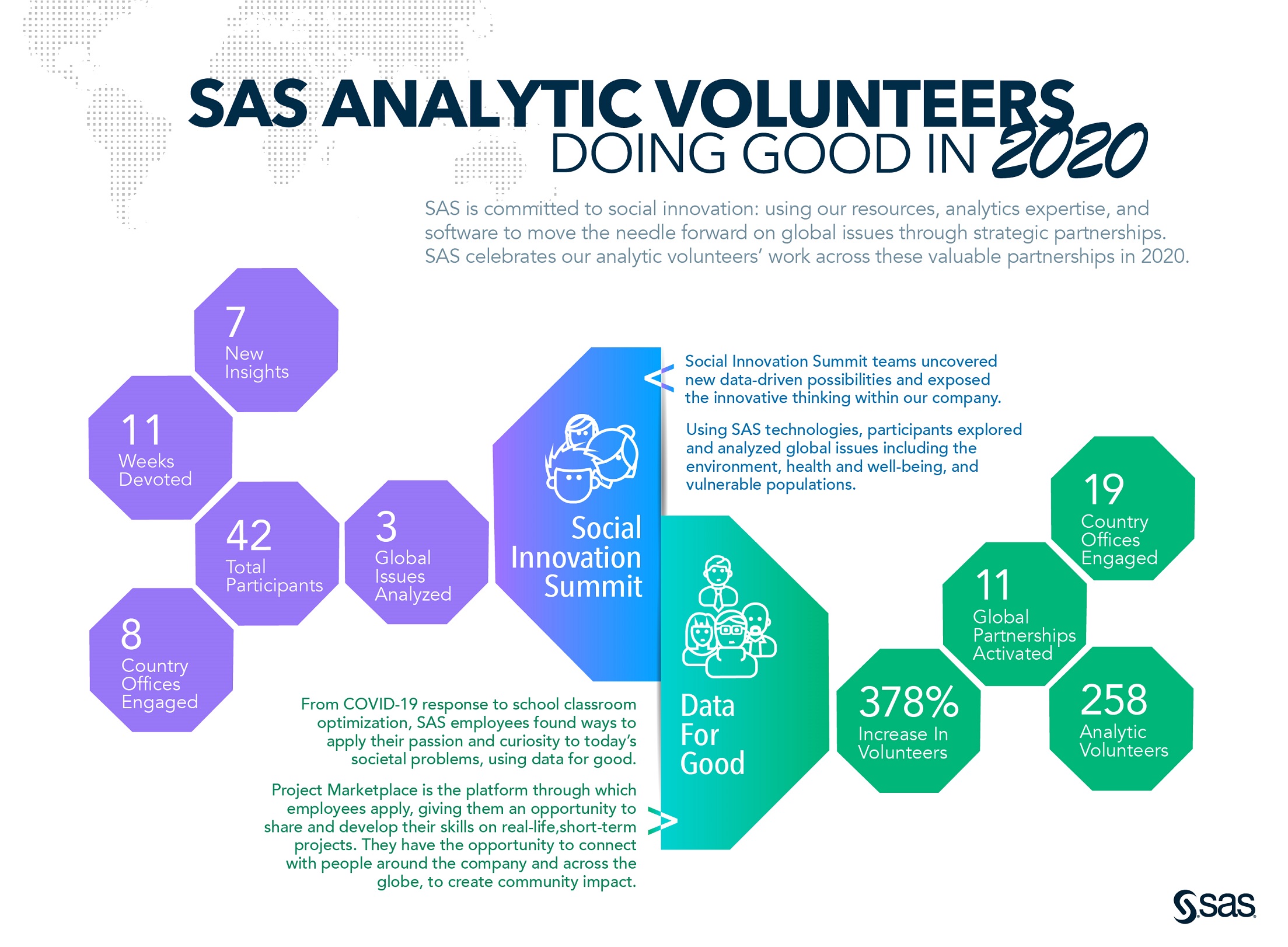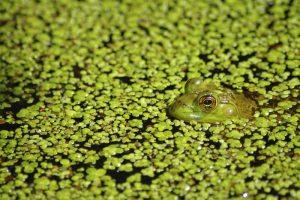From mental health to biodiversity, SAS is committed to using data for social innovation, committing our resources, analytics expertise and software to tackle global issues. It's a vital undertaking, and we can't do it alone -- strategic partnerships are key to these efforts. Here's a quick overview of our top data for good projects and partnerships from 2020:
1. Is there a faster way to protect biodiversity?
With the world currently facing an unprecedented rate of extinction, SAS joined forces with NatureServe, an organization focused on protecting biodiversity, to use analytics and artificial intelligence (AI) to analyze over 7 million known species of plants and animals on Earth. These assessments are traditionally a costly and highly manual process, but with SAS’ machine learning and text analytics capabilities, NatureServe can now produce more automated, reliable analysis and gain insights faster.
2. Can the placement of wells help eliminate water poverty?
Clean water shouldn’t be a luxury. Yet, in many parts of the world, people spend hours each day fetching clean water, a process that keeps them away from work, family and education. Water for Good is a nonprofit aiming to end water poverty in underserved regions of the Central African Republic (CAR). Using advanced analytics, SAS created a custom dashboard that maps water access in CAR. The dashboard, built using SAS® Visual Analytics, allows Water for Good to better understand the quality of existing wells and make smarter decisions about where to drill new wells, helping to eliminate water poverty overall.
3. Is it possible to detect deforestation in the rainforest?
When considering the devastation taking place within the Amazon rainforest, SAS and IIASA wanted to know if it was possible to predict deforestation before it happened. Together, the two organizations developed a model to detect the earliest signs of deforestation in the rainforest by combining the power of crowdsourcing and AI. This effort is providing decision makers the ability to detect change in the Amazon and alert conservation and government organizations responsible for protecting it.
4. How can we safeguard the mental health of patients during a global pandemic?
Maintaining the well-being and mental health of patients only intensifies in a global pandemic. The management at Copenhagen Regional Psychiatric Centers needed a dynamic way to evaluate 100 psychiatric care centers and prevent contagion for both patients and staff. Leveraging an automated dashboard created by SAS, they now have a real-time data feed illustrating the COVID-19 pandemic’s impact across all facilities.
5. Is it feasible to empower children to improve all areas of their lives?
380 million children around the world are trapped in a cycle of poverty. Zoe Empowers, a global nonprofit, works to end this grueling cycle and empower children to improve all areas of their lives. SAS used advanced analytics to develop a self-sufficiency index that measures the program’s effectiveness across eight defined areas of intervention. From food security to education to developing a steady income, the index allows Zoe Empowers to evaluate whether children are truly self-sustaining across all areas of life.
6. How does tracking COVID-19 data protect citizens and prevent future crises? 
The priority of state and local governments during moments of crisis is to ensure the safety of their citizens. The COVID-19 pandemic required all government bodies, like the Government of Odisha, to move nimbly and develop strategies to prevent future spread. With the help of SAS and CSM Technologies, the Government of Odisha combined their health care related data sets with advanced analytics to create a COVID-19 dashboard, providing a data-driven approach to containing the virus and saving lives.
7. Can IoT and analytics preserve bee populations and the global food supply?
Saving the bees is of utmost importance to our food supply and advanced analytics may be the key to maintaining their future and ours. With SAS’ Internet of Things (IoT), machine learning and visual analytics capabilities, we might get closer to maintaining and supporting healthy bee populations. SAS researchers developed a noninvasive way to monitor real-time conditions of beehives through auditory data and machine learning algorithms. Recent SAS® Viya® Hackathon winners decoded bee communication through machine learning to maximize bees' food access and boost human food supplies.
8. What factors contribute to racial disparities in homeownership?
The first step to racial equity is to identify inequities. The Center for New York City Neighborhoods, one of the largest nonprofits committed to protecting affordable homeownership for low- and moderate-income families, turned to SAS to help identify the roadblocks preventing Black and Hispanic individuals from accessing and maintaining homeownership. The analysis conducted by SAS analytics experts revealed two contributing factors: higher closing costs and overall health conditions of Black and Hispanic owned homes.
What's next?
SAS teams, partnering with global organizations, have uncovered new data-driven possibilities and exposed the innovative thinking within our institutions. Yet, these were just a few of the problems we worked on and we know there is still so much more that can and should be done. Tell us about the global problems where you think analytics can make a difference.



5 Comments
Would love to see SAS software help save the koala!!! I read an article recently which stated "That AI technology already exists, but does not yet work in real-time." Thought that with SAS Event Stream Processing it probably is possible... what do you think? https://twitter.com/HomesAtMetacoda/status/1348239706576756741
The Australian Koala Foundation would be a fabulous organisation to work with as they have over 30 years of data and the results would help with providing the analytics and insight to support Deborah Tabart's goal in Australia enacting a Koala Protection Act (similar to the Bald Eagle Act) https://www.savethekoala.com/our-work/deborah-tabart-oam
Hi Michelle,
This sounds like a wonderful candidate for a Data for Good project. I will reach out to you individually and see how we can connect to learn more about this effort. Thank you for the suggestion!
~ Lee Ellen
Very interested to learn more about Data for Good projects. Some wonderful stories here and so good to hear of technology working for the greater global good. I'd like to see/hear these great stories told in more detail to bigger audiences.
These are some great projects. I would love to see some work with marine wildlife - for example, overfishing, use of sonar in the ocean, extinction of such species as the right whale, impacts on orcas, effect of global warming on the presence of species in non-native areas, etc. I'd also like to see SAS highlight its abilities in the area of geocoding and graphic representation of research in the above areas, maybe incorporating the ability to read LIDAR and satellite imagery technologies.
Thank you so much for the feedback, Louise. We just added Healthy Reefs for Healthy People as a partner in GatherIQ (https://app.gatheriq.analytics/2140_healthy_reefs_for_healthy_people). We're working on ways to highlight their work, which encompasses some of your suggested topics but not all. We appreciate your interest in having SAS pursue issues like this!